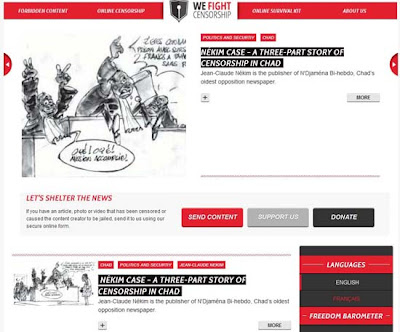Tuesday, November 27, 2012
How to make censorship 'obsolete' - a bold new RSF digital strategy
REPORTERS sans frontières (RSF - Reporters Without Borders) has launched a website called WeFightCensorship (WeFC) on which it will post content that has been censored or banned or has given rise to reprisals against its creator.
This original website’s aim is to make censorship obsolete. It is an unprecedented initiative that will enable Reporters Without Borders to complement all of its other activities in defence of freedom of information, which include advocacy, lobbying and assistance.
Content submitted by journalists or netizens who have been the victims of censorship – articles, videos, sound files, photos and so on – will be considered for publication on the WeFightCensorship site.
The content selected by the WeFC editorial committee will be accompanied by a description of the context and creator. It may also be accompanied by copies of documents relating to the proceedings under which it was banned or other documents that might help the public to understand its importance.
There will be French and English-language versions of the site. Documents from all over the world will be published in their original language (including Chinese, Persian and Vietnamese) and in translation.
The site is designed to be easily duplicated and mirror versions will be created in order to thwart attempts to filter or block it. Internet users will be asked to circulate the censored content in order to give it as much visibility as possible.
“Reporters Without Borders is providing a deterrent designed to encourage governments and others to respect freedom of information, the freedom that allows us to verify that all the other freedoms are being respected,” Reporters Without Borders secretary-general Christophe Deloire said.
“This website aims to exploit the so-called ‘Streisand effect,’ under which the more you try to censor content online, the more the Internet community tends to circulate it. We want to show that jailing an article’s author, seizing copies of a newspaper or blocking access to a website with a certain video can prove very counter-productive and can result in the content going around the world.”
By accessing a secured “digital safe,” Internet users will be able to submit content for publication anonymously.
The website will also offer a “digital survival kit” with information about Virtual Private Networks (VPNs), encryption software such as TrueCrypt, online anonymization techniques such as Tor and other tools that news providers can use to protect their sources and, in authoritarian countries, their own safety.
Private access to a beta version of the site has already been available since 13 November to those that register. To support the launch, the Publicis Bruxelles advertising agency devised a campaign ad free of charge that shows several heads of State, including Vladimir Putin, Mahmoud Ahmadinejad and Bashar al-Assad in their birthday suits with the legend “Totalitarian regimes will no longer be able to hide anything from us.” It will appear in the print media and online.
Reporters Without Borders is an NGO with consultative status at the United Nations, UNESCO and the International Organisation of the Francophonie. It has its international secretariat in Paris, 10 international bureaux (in Berlin, Brussels, Geneva, Madrid, New York, Rome, Stockholm, Tunis, Vienna and Washington) and more than 150 correspondents across all five continents.
The WeFC project is supported by the European Union’s European Instrument for Democracy and Human Rights (EIDHR) and the Paris City Hall.
>>> Popular Café Pacific Posts
-
Photo: Del Abcede / PMC THE MOST astonishing unreported story in this week’s Pacific Island Forum in Auckland was a remarkable shift by the ...
-
New Zealand Labour MPs Louisa Wall and Kris Fa'afoi, a former journalist, speaking about the Marriage Amendment Bill and Pacific cul...
-
MELBOURNE-based Fiji academic and commentator Dr Mosese Waqa (caricature) had some kind words to say about the Pacific Scoop coverage of th...
-
AWARD-WINNING filmmakers Annie Goldson ( Brother Number One, An Island Calling ), and Kay Ellmers ( Canvassing the Treaty, Polynesian Panth...
-
The arrests of more than 1600 protesters in West Papua earlier this week are part of a broader systematic oppression of Papuans by the I...
-
Greenpeace activists create a solar symbol around a world-famous Paris landmark, the Arc de Triomphe. © Greenpeace OPINION: By Kum...
-
This picture taken on January 18, 2015 shows a giant half-broken pencil near the headquarters of French satirical newspaper Charlie ...
-
University of Papua New Guinea's Emily Matasororo ... in the bac k ground, images of heavily armed police shortly before they opene...
-
Rongelap islanders with their belongings approach the Rainbow Warrior in May 1985. Image: (c) David Robie SPECIAL REPORT: By David Rob...
-
Two Indonesian Air Force military policemen stomping on the head of a deaf Papuan teenager, Steven Yadohamang, in the Merauke region on 26...









No comments:
Post a Comment